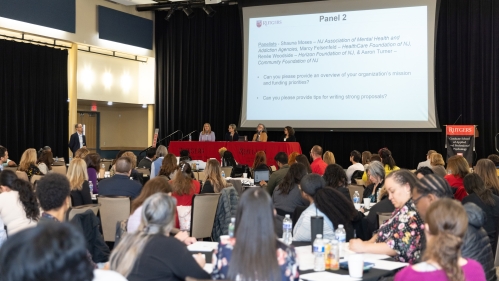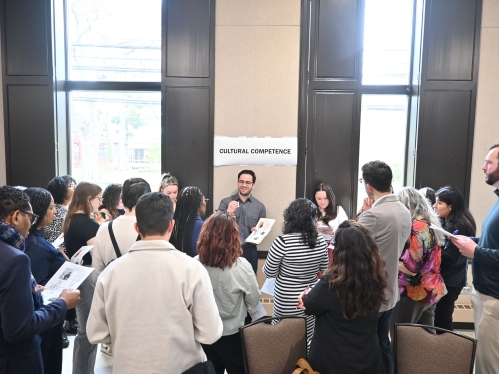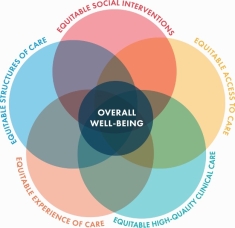
Community Mental Health Summit
Collaborative Relationships
The CYSEW Community Mental Health Summit is a unique annual event that brings together leaders from New Jersey community organizations, state-level entities, foundations, and schools focused on improving youth mental health outcomes to develop a strategic and cohesive roadmap forward and to form partnerships.
The Summit directly addresses the fragmentation seen in the tristate behavioral health system by developing a common agenda, reducing overlap, increasing service visibility, and improving continuity of care.
Over 125 unique community organizations, state entities, nonprofits, and schools participate in the summit each year. Summits begin with a panel of youth and/or caregivers who share their stories and provide insights about what summit attendees can do to improve the behavioral health system. Attendees then participate in a resource focused session, for example hearing from state mental health and education agencies about resources that are available or receiving hands-on training in behavioral health skills and strategies that they can take and apply in their communities.
The majority of the day is spent having attendees meet with each other, form new relationships, and begin to develop partnerships that will benefit the mental/behavioral health of youth by improving continuity of care. Attendees work across organizations and disciplines on specific tasks, such as increasing access to wellness and prevention services or reducing stigma and empowering youth. Attendees are then eligible to apply for grant funding from CYSEW to further those partnerships during the year.

Recent Summit Media Coverage
NJ Spotlight News attended the 2025 summit and interviewed the CYSEW director, panelists, and attendees.
CYSEW's Community Mental Health Partnership Grants
2025 Grants
2024 Grants
We would like to thank our event sponsors, which have included: the Society of Clinical Child and Adolescent Psychology (SCCAP), American Psychological Association (APA) Division 53, the Farris Foundation, and the Rutgers Graduate School of Applied and Professional Psychology (GSAPP)
2024 and 2025 Summit Sponsors


2023 Summit Sponsors


2023 Youth Mental Health Equity Summit: Barriers & Solutions

Barrier 1: Limited integration across community organizations, schools, and colleges/universities creates a confusing system that is difficult to navigate.
Solution 1: Increase collaboration to develop interconnected systems of care and researcher/community partnerships that will increase access and continuity of high-quality mental health care.
- Expand call centers designed to provide clear guidance to parents/caregivers on where to find services. Call centers must have knowledge of insurance options, specific areas of expertise, and current wait times.
- Move away from the current “one and done” treatment model by better-coordinating tiered systems of care. Clearly identify service paths that facilitate youth seamlessly moving from wellness and prevention services to treatment services and back again.
- Increase the frequency of cross-disciplinary and cross-organization collaborative community events. Events are needed at the broad NJ level and at the regional level.
- Foundations and other funders should focus on supporting community/researcher partnerships that involve multiple types of community agencies along with researchers to evaluate implementation and outcomes.
- Organize summit attendees and the broader community to advocate for strong reimbursement models for integrating mental health care into school, pediatric, and community settings and for the expansion of telehealth reimbursement.
Barrier 2: Lack of information and open communication about wellness and mental health leads to stigma and confusion about when and how to seek support.
Solution 2: Increase education and empowerment opportunities for teachers, parents, youth, and others who frequently interact with youth (e.g., pediatricians, religious leaders, etc.).
- Develop events similar to the summit but for parents and youth to provide collaborative opportunities to engage, support, and learn.
- Empower parents and teachers by providing them with the information needed to talk openly and knowledgably with youth about wellness and mental health.
- Increase mental health education in schools to normalize communication and reduce stigma.
- Encourage and facilitate youth-led social media campaigns around wellness and mental health.
- Develop workshops that provide practical and realistic wellness and mental health communication strategies and specific language for parents and teachers to use.
Barrier 3: Structural and financial barriers lead to an inadequate wellness/mental health workforce.
Solution 3: Reduce financial and licensing barriers to mental health careers in NJ and develop additional wellness focused applied bachelors or masters level degrees and certificates.
- Advocate to make mental health licensing processes in NJ less costly and burdensome. NY process/rules noted as a potential model.
- Increase financial support for students pursuing education to enter the mental health workforce. This could include fellowships that require commitment to work in a particular NJ community while training and for a set period of time post-graduation.
- Increase bachelor’s, certificate, and master’s level opportunities that are applied in nature and provide training in evidence-based wellness and prevention programs and strategies.
- Rapidly scale-up integrated models of mental health care by increasing cross-disciplinary training programs that teach providers to deliver holistic treatment in multiple types of organizations.
- Expand insurance reimbursement options for wellness and prevention services delivered by providers at all levels (e.g., bachelors to doctoral).
Barrier 4: Focus on treatment and crisis intervention, while critical, leads to missed opportunities to promote wellbeing and resilience.
Solution 4: Expansion of community and school wellness activities, particularly clubs and events that empower and support youth to advocate and lead.
- In schools and communities, explicitly focus on fostering positive peer relationships and interactions to combat rapidly rising rates of loneliness and isolation.
- Develop curriculum where teachers/professors openly discuss wellness challenges, stress, and coping strategies and model caring for others health and wellness as part of education.
- Expand wellness/mental health focused school/community youth-led projects, clubs, and events that empower youth to take on leadership and advocacy roles.
- Develop additional peer-to-peer programs that provide financial support for youth who receive training and lead advocacy efforts and support groups.
“It’s time we change the narrative, shift the dialogue, and combat the stigma surrounding mental health issues, particularly among our nation’s youth.” - Schuyler DeBree, 2024 Summit speaker (Website | Podcast)
